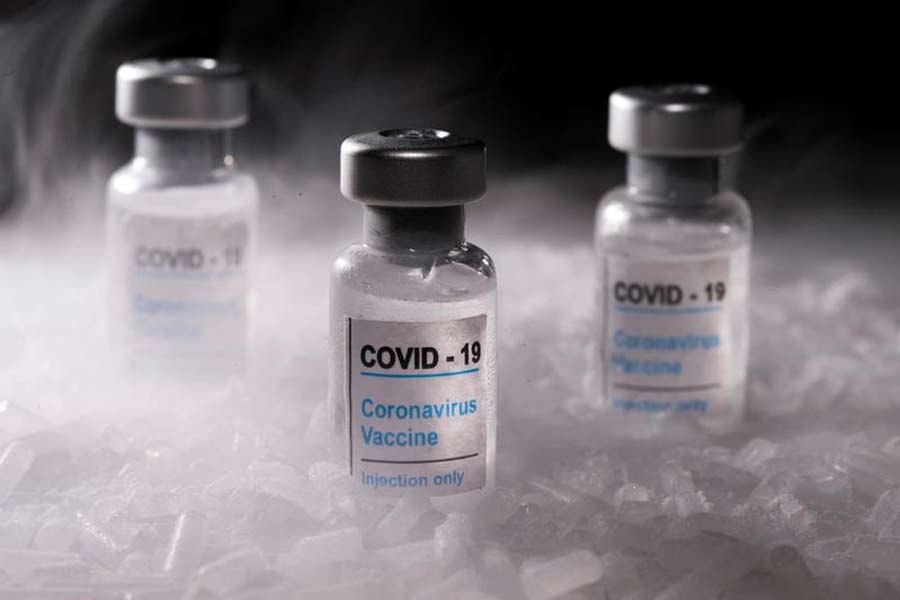Both Covid-19 infections and fatalities are now at their lows. The rate of infection after reaching the record high has now come down to below 4.0 per cent. Life has become almost normal after months. Educational institutions are coming to life gradually. Industries and commercial enterprises are back to business.
Life, however, is yet to get back the usual rhythm. The fear of a resurgence of Covid infection is still haunting many minds.
A section of people has never taken the disease seriously and ignored the safeguard measures. The receding virulence of the pathogen has only made them even bolder in their defiant approach. The market places, tourist spots and public transports are now crowded as they used to be during normal times. What is worrying the health experts and other conscious individuals is that the number of people wearing facemasks is far fewer than those roaming around without masks.
One particular achievement --- vaccination of a large portion of the population --- could have lessened the worry, to a large extent. Unfortunately, the progress made in this area has been disappointingly low. Barring war-torn Afghanistan, the Covid vaccine coverage here, in terms of jabbing of two doses, is the lowest among the South Asian nations. Only 10 per cent of the country's population has got two doses of the Covid-vaccine, followed by Pakistan --13 per cent.
Bhutan, the Maldives and Sri Lanka respectively have so far covered 67 per cent, 62 per cent and 53 per cent of their populations. India that has the world's largest vaccine producing facility, has provided two-dose vaccines to only 17 per cent of its population.
The low vaccine coverage in Bangladesh, however, does not match with what the men in power say in public about the Covid vaccination. Their high-sounding claims tell altogether a different story.
The launch of the vaccination programme in February last was perfect and well-organised. People in their thousands got the jabs at the designated vaccination centres in an orderly manner and the management of the programme was strikingly efficient. But the programme suffered a big jolt when the Serum Institute of India (SII) had stopped the supply of Covishield (AstraZeneca) vaccine to Bangladesh in breach of a 'tripartite' contract.
The situation, as far as the Covid vaccination programme is concerned, is yet to get back its initial pace and efficiency. When the vaccination programme started in February last, a sizeable portion of the population was not particularly enthusiastic about it. There was no rush for taking the jabs also.
But the deadly second wave came as a great motivator. As the SARS-CoV-2 virus started infecting slum dwellers and villagers whom many had considered 'immune' to infection, people across the board got really scared. Millions of people got themselves registered with the health authorities seeking to be vaccinated.
Beyond that there is still a sizeable poor and uneducated people who are staying away from formal registration but want the vaccines. Only a few people are unwilling to take Covid jabs now.
When the people in large numbers are willing to get the Covid jabs, the government is not in a position to meet all their demands. True, the government has administered vaccine doses to various groups of people, including students and teachers of public universities, frontline health workers and technologists. Then again, under a couple of mass-vaccination programmes, many people have received Covid jabs very recently. Here, the health authorities overlooked the special need of the elderly and some other vulnerable people. All over the world, these people have got priority over others in vaccination programmes.
When the government's vaccination programme is going on haphazardly, millions of people who got them registered with the DGHS (directorate general of health services) for getting Covid jabs have been waiting for more than a couple of months. They do not know when they would get the call (SMS).
The problem is if the Covid infection and fatality rates remain at a low level and life goes on the way it does now, many people in the queue may become uninterested in the vaccine and skip it. They might develop a feeling that the disease is gone and it would not come back.
It is scientifically proven that Covid would not go away and all will have to live with it. The best possible way to deal with the situation is to get vaccines. People may have to take booster doses from time to time. Some drugs effective against the virus might soon also hit the market. An oral pill named molnuoiravir that has been found to cut hospitalisation or death of Covid patients might soon receive US FDA approval. The drug which is designed to introduce errors into the genetic code of the coronavirus will be the first oral antiviral medication for Covid-19. It is certainly a piece of exciting news.
At the moment, the government has a stock of 5.0 million doses of vaccine. This can be sufficient for a weeklong vaccination programme.
The health minister on Saturday sounded optimistic about receiving vaccines enough to inoculate 20 per cent of the population by December next and 40 per cent within a 'short period'. Only time will prove how true his optimism is.


